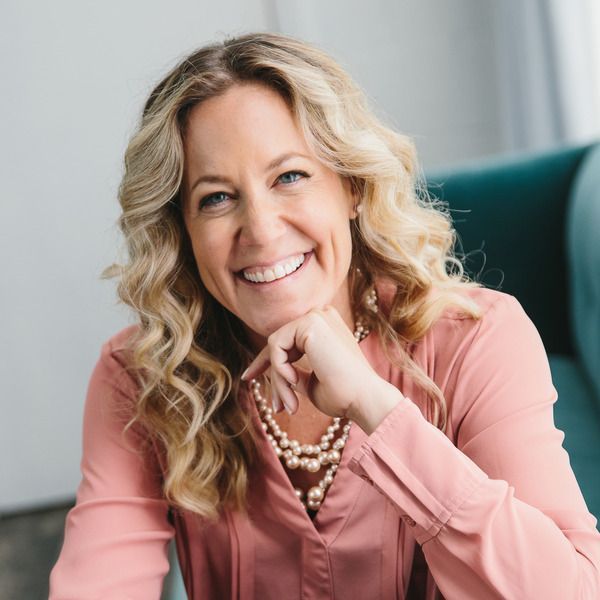5 Benefits of Practicing Nonviolent Communication as a Parent

5 Benefits of Practicing Nonviolent Communication as a Parent
When I first became a parent to Myles and Charlotte, I had the same dreams that many of us do: that my children would feel deeply loved, truly heard, and confident in who they were.
But early on, I realized something important. No matter how much I loved them, love alone wasn’t enough to create the emotional freedom and connection I wanted for our family.
The missing link was how I communicated, especially in moments of stress. In my early years of practicing Empowered Parenting, I thought the goal was simply (ha!) to teach myself not to yell. But kids are so perceptive. They are aware of our emotional state, even when we think we are doing our best to hide it.
In those early years, without realizing it, I sometimes leaned into old patterns. I gave urgent commands, shut down when overwhelmed, or rushed to “fix” uncomfortable emotions. These were echoes of how I was raised. Not because my parents didn’t love me, but because they didn’t have the tools of Nonviolent Communication (NVC) that I now know to be transformational.
Practicing Nonviolent Communication as a parent isn’t about getting it right. It’s about creating a home where every voice matters, where feelings are honored, and where conflicts become opportunities for deeper understanding.
The insight finally came… Communication that does not cause harm requires us to name, acknowledge, and process our emotions within conflict or challenging conversations.
Now, with Myles and Charlotte both off at college, I see the lasting impact of the shifts we made. I’m grateful every day that we built these skills together, imperfectly but persistently.
Here are five powerful ways that practicing Nonviolent Communication has shaped our family and how it can transform yours, too.
1. Builds Trust and Emotional Safety
Growing up, many of us learned that using our voice could be risky. We might be shamed, ignored, or punished for speaking our truth.
One of
the foundations of Transformational Parenting is the commitment to freedom from blame, shame, control, and fear-based relating.
I had to start by reflecting honestly.
Did Myles and Charlotte feel safe bringing me their big feelings?
Was I meeting their emotional expressions with curiosity, or with urgency to fix?
When Charlotte was 14, she had a devastating falling out with a close friend. Her heartbreak was raw, and my instinct was to jump into advice-giving mode. “Don’t worry, you’ll make new friends.” “You’re so strong, you’ll get over this.”
But with the principles of NVC in my heart, I caught myself. Instead, I sat with her and simply said, “It sounds like you’re feeling hurt and maybe even betrayed. That makes so much sense. I’m here.”
That moment, sitting side-by-side on her bed without rushing her sadness, built more trust than a thousand reassurances ever could.
Practicing NVC taught me that emotional safety isn’t about removing pain. It’s about offering presence and empathy in the middle of it. It’s about showing our children that their experiences, even the hard ones, are worthy of being seen and honored.
Over time, Myles and Charlotte both came to trust that home wasn’t a place where feelings were too much. It was a place where feelings could land safely.
2. Reduces Conflicts and Misunderstandings
Another hallmark of Transformational Parenting is freedom from emotional reactivity.
Before practicing NVC, many of our conflicts were fueled by misinterpretation. I would assume the worst. “He’s being disrespectful,” I’d think, instead of getting curious. “What’s going on under the surface?”
I vividly remember a season when Myles, in his junior year of high school, seemed perpetually grumpy and withdrawn. My gut reaction was to take it personally. “Why is he being so rude to me?”
But when I paused and leaned on
the Empowered Parenting Conversation steps—connecting first, seeking consent, clarifying my intention—I learned the real story.
Myles was overwhelmed with school, worried about college applications, and carrying stress he didn’t know how to name.
By creating space to hear his feelings without judgment, we dissolved weeks of brewing resentment in a single, heartfelt conversation.
NVC taught me that most conflicts are really misunderstood emotions. When we focus on connection over correction, conflict loses its power to divide us.
3. Teaches Children Empathy and Emotional Regulation
One of the greatest gifts we can offer our children is the ability to feel their feelings fully without getting trapped by them.
I often ask parents:
What beliefs is your child forming about their voice, feelings, and needs?
When Charlotte was younger, she struggled with anxiety, especially before tests or performances. I can still picture her, little legs swinging nervously off the kitchen stool, wringing her hands before a big spelling bee.
In those moments, my impulse was to soothe it away. “It’s not a big deal. You’ll do fine.”
But with NVC, I learned to meet her where she was.
Instead, I said, “It’s so normal to feel nervous when something matters to you. I get nervous, too, when I want to do my best.”
Validating her feelings gave Charlotte a new template: Feelings aren’t problems to fix. They are experiences to move through.
Today, in college, she still checks in with me when big feelings arise. Not because she needs me to solve them, but because she trusts that her feelings are safe to express and be honored.
She recently called me before giving a presentation in front of the mayor of Miami. Together, we prepared her for her nerves. Old me would have told her, “You’re going to do great!” But public speaking is nerve-wracking.
When we
model empathy toward our children’s feelings, they internalize that same compassion toward themselves. It becomes a skill that will carry them through life, far beyond our home. (And yes… she did GREAT!)
4. Enhances Problem-Solving Skills
NVC isn’t just about kindness. It’s a framework for creative problem-solving.
When conflict arises, the old default—blame, shame, control—shuts down solutions. But when we follow the steps of Empowered Conversation (connect, consent, intention, affirmation, concern, ownership, feelings and needs, empathy, request, appreciation), a totally different energy emerges.
One summer, Myles and I had a huge disagreement about curfews. I wanted him home earlier. He wanted more freedom.
The old parenting scripts would have led me straight to control. “This is my house, my rules. However, while practicing NVC, I approached it differently.
I stated my intention. “I want us to find a curfew that keeps you safe but also honors your growing independence.”
I named my feelings and needs. “I feel worried when I don’t know you're safe. I need reassurance and good communication.”
Then I invited his perspective. “What feels reasonable to you?”
Myles shared that part of his resistance was feeling micromanaged. He wanted to be trusted to make good decisions.
Together, we created a flexible agreement, including regular check-ins.
The result wasn’t just a curfew plan. We also strengthened our ability to solve problems together and built a mutual sense of respect.
True problem-solving happens when every voice—child and parent—is valued.
5. Strengthens Family Connections Across a Lifetime
Now that Myles and Charlotte are in college, I see even more clearly. The seeds we plant through compassionate communication bear fruit over decades.
When we were building these habits, it wasn’t perfect. I still had moments of impatience and reactivity. I still slipped into old patterns.
But because we practiced repair—circling back after a misstep, apologizing, and returning to connection—we built a bond that’s stronger than any individual rupture.
Today, Myles will call me to talk through challenges with roommates. Charlotte will send long texts about her big emotions and her navigating college life.
They trust that they can bring their whole, messy selves to me. Because over the years, we practiced listening without judgment, validating feelings, and collaborating toward understanding.
That’s what NVC gave us. It gave us trust that lasts beyond childhood.
When we embrace Nonviolent Communication, we’re not just solving today’s problems. We’re building a bridge to tomorrow’s relationship with our children.
The habits we practice in our living rooms echo into our children’s dorm rooms, board rooms, and even into the families they will one day create.
Effective communication with our kids is a journey, not a destination…
Learning to practice Nonviolent Communication isn’t about becoming the perfect parent. It’s about creating a family culture where:
- Freedom, not fear, defines how we relate
- Empathy, not power, leads our conversations
- Trust, not control, becomes the foundation
It starts with your own voice. Healing the places where you may have been silenced or shamed. Choosing to communicate in a way that offers your children what you might not have received yourself—the deep, unwavering belief that their voice matters.
The 10 steps of Empowered Conversations offer a powerful map. But ultimately, it’s your daily practice, your humility, and your willingness to grow that will transform your family.
Myles and Charlotte’s journeys remind me every day.
The work we do to heal and grow as parents doesn’t end with us.
It ripples out into our children’s lives, their future relationships, and the families they will one day create.
And that, truly, is the voice of transformational parenting.
Ready to bring these principles into your own home?
If you're yearning for deeper connection, more peaceful communication, and a family culture rooted in trust and empathy, we’re here to walk with you.
Join our Parent Coaching Program and gain the tools, support, and guidance you need to transform the way you relate to your children—starting today.
Meet Your Author, Kiva Schuler
Jai Founder and CEO
Kiva’s passion for parenting stemmed from her own childhood experiences of neglect and trauma. Like many of her generation, she had a front row seat to witnessing what she did not want for her own children. And in many ways, Jai is the fulfillment of a promise that she made to herself when she was 16 years old… that when she had children of her own, she would learn to parent them with compassion, consistency and communication.
Kiva is a serial entrepreneur, and has been the marketer behind many transformational brands. Passionate about bringing authenticity and integrity to marketing and sales, she’s a sought after mentor, speaker and coach.
Share This Article:
Curious for more?














